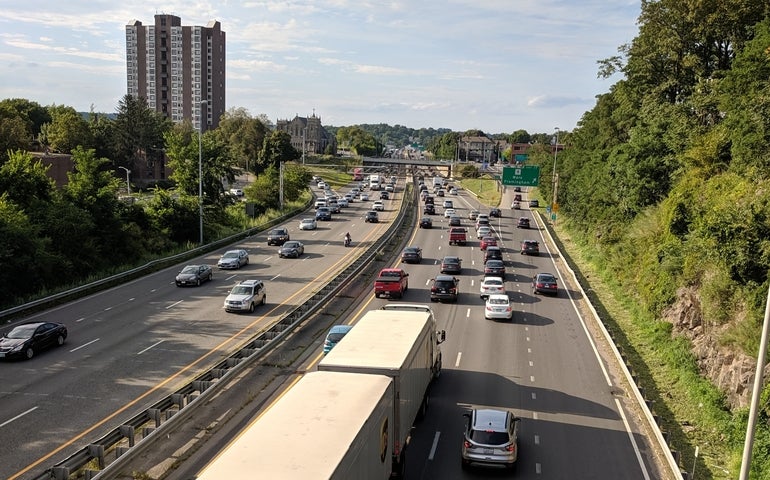If President Joe Biden can secure enough congressional support for his $2 trillion infrastructure proposal, Massachusetts officials will need to be ready to take advantage of the funding influx, construction and design industry leaders say.
Biden is pushing for a package that would invest hundreds of billions of dollars in the country’s roadways, railways, airports and waterways with specific focus on green improvements and environmental justice. He suggested funding the bill, which is under review in Congress, through increased taxes on corporations.
The Bay State’s ultimate share of the funding could have a “huge impact” on employment and the region’s economy, according to Construction Industries of Massachusetts Executive Director John Pourbaix.
“The multiplier effect is incredible and it would really help the economic vitality of the region,” Pourbaix said.
To capitalize on those benefits, Pourbaix said, lawmakers and the Baker administration must prepare to spend. Without sufficient planning, he said, officials might be caught flat-footed with not enough projects ready to take advantage of the federal funds.
“One of the big things I see lacking, at least in Massachusetts, is a number of projects that are designed, ready to go, on the shelf when the funding becomes available,” he said during a panel discussion hosted by the New England Council. “When the money becomes available or something eventually gets passed, there will be a ramp-up time, but we’ll be prepared to adjust and get the job done.”
Asked about the state’s readiness to react to a potential influx of infrastructure funding, Department of Transportation spokesperson Judith Riley said in a statement, “MassDOT and MBTA have built up strong capital capacity and are ready to immediately use any additional federal funding to fund our programs and projects.”
Lisa Wieland, CEO of the Massachusetts Port Authority, said during the New England Council event that she believes there should be “no problem” for her quasi-public agency to react to Biden’s bill.
“From our perspective, we certainly would say we are ready to manage the flow of funding that would come that would enable us to advance some projects,” Wieland said.
The COVID-19 pandemic and the uncertainty it created, both in terms of financial impacts and long-term travel outlooks, upended capital plans in several transportation agencies.
MassDOT and the MBTA both typically produce five-year capital investment plans charting long-term improvements to their assets, but both agencies opted to develop single-year plans for 2021 because of the pandemic.
At Massport, Wieland said the organization suspended about $1 billion in planned capital projects when the public health crisis first hit. About 85 percent of those were focused on Logan International Airport, Worcester Regional Airport or Hanscom Field.
“That doesn’t even get into all the investments we need to make on the road to net-zero (emissions) or future technologies,” Wieland said, describing the funding for airports in Biden’s proposal as a “great start.”
Among its major investments, the bill Biden unveiled this month would direct $115 billion toward road and bridge repairs, $85 billion to modernize public transit, $80 billion on Amtrak repairs and inter-city passenger rail expansions, $174 billion to expand production of electric vehicles, and $25 billion to support airports, according to a fact sheet.
The plan, HNTB Corporation Associate Vice President Ellen White said during Tuesday’s panel, carries “tremendous potential for long-term job creation” in both the public and private sectors. She highlighted its particular focus on promoting resilience in the face of climate change.
“What’s different about the American Jobs Plan is the magnitude of the investment and the focus on climate change, sustainability and environmental justice,” White said. “This is a once-in-a-lifetime opportunity to make some transformational investments and needed changes to our transportation system. This could be electrification of our commuter rail system, extended train service to western Massachusetts or new cars for the Green Line.”
In the 2019-2020 lawmaking session, both Gov. Charlie Baker and then-House Speaker Robert DeLeo pushed similar proposals to invest more than $1 billion in municipal projects preparing for the impacts of climate change.
Wieland said state leaders will need to balance retrofitting existing infrastructure to cope with changing conditions and building new, more resilient assets.
“It’s generally easier to build new, but let’s face it: we don’t really have a choice necessarily,” White said in response. “We’re stuck with existing infrastructure that is old and it needs to be maintained and operational most of the time during construction. That’s certainly a challenge and an expense for all of us to consider.”
The Biden administration has pointed to glaring infrastructure problems in Massachusetts as part of its campaign in favor of the bill, producing a state-specific summary highlighting the Bay State’s increasing commute times, damage from extreme weather events, lack of affordable housing and more.
Massachusetts has 472 bridges and more than 1,194 miles of highway in poor condition, according to the White House.
Municipal leaders have been calling for years for state government to spend more on road and bridge repair, unsuccessfully urging an increase in the annual appropriation through the Chapter 90 program from $200 million to $300 million or a two-year allotment of funding.

